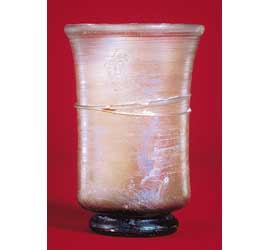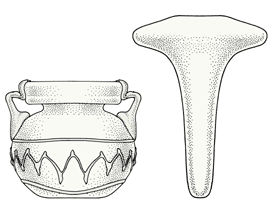- Glass Making in Roman Times
- Roman Wine: A Window on an Ancient Economy
- Roman Wine: Windows on a Lifestyle
- Fine Glassware in the Roman World
- Reuse of Images in the Art of Rogier van der Weyden
Everyday Use

Wine beaker
Late 4th century A.D.
Ht., 11.7 cm

Left: Jar-shaped lamp
5th century A.D.
Right: Long-stemmed lamp
6th century A.D.
While poets wrapped silken words around glass's transparency, most Romans enthused over glass just for its practical everyday value.
As window panes:
"The house is large enough for my needs but not expensive to keep up. It opens into a hall...and then there are two colonnades, rounded like the letter D, which enclose a small but pleasant courtyard. This makes a splendid retreat in bad weather, being protected by windows and still more by the overhanging roof." (Pliny the Younger, Letters II.17)
As wine beakers:
"We drink out of a glass, you from a murrhine, Ponticus. Why? Lest a transparent goblet reveal you are serving two kinds of wine." (Martial, Epigrams IV.85)
As lamps in churches:
"Then, in the middle of the basilica hang hollow lamps, attached to the high ceiling by brass chains. They look like trees throwing arms like vine shoots; at their tips the branches have glass goblets as their fruit, and the light kindled in them is, so to say, their spring blossoms. With the abundant foliage of their flames, they resemble close-packed stars, and stud the heavy darkness with countless flashes." (Paulinus of Nola, Poems XIX.416).
Transparency was the one property of glass with which pottery, its main rival in the domestic marketplace, simply could not compete.
